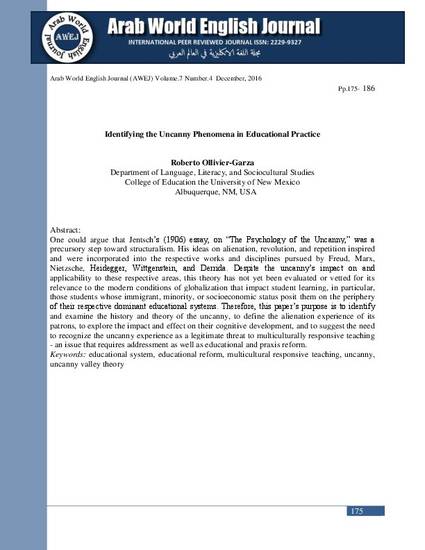
Article
Identifying the Uncanny Phenomena in Educational Practice
Arab World English Journal
(2016)
Abstract
One could argue that Jentsch’s (1906) essay, on “The Psychology of the Uncanny,” was a precursory step toward structuralism. His ideas on alienation, revolution, and repetition inspired and were incorporated into the respective works and disciplines pursued by Freud, Marx, Nietzsche, Heidegger, Wittgenstein, and Derrida. Despite the uncanny’s impact on and applicability to these respective areas, this theory has not yet been evaluated or vetted for its relevance to the modern conditions of globalization that impact student learning, in particular, those students whose immigrant, minority, or socioeconomic status posit them on the periphery of their respective dominant educational systems. Therefore, this paper’s purpose is to identify and examine the history and theory of the uncanny, to define the alienation experience of its patrons, to explore the impact and effect on their cognitive development, and to suggest the need to recognize the uncanny experience as a legitimate threat to multiculturally responsive teaching - an issue that requires addressment as well as educational and praxis reform.
Keywords
- educational system,
- educational reform,
- multicultural responsive teaching,
- uncanny,
- uncanny valley theory
Disciplines
Publication Date
Winter December 15, 2016
Citation Information
Roberto Ollivier- Garza. "Identifying the Uncanny Phenomena in Educational Practice" Arab World English Journal Vol. 7 Iss. 4 (2016) p. 175 - 186 ISSN: 2229-9327 Available at: http://works.bepress.com/arabworldenglishjournal-awej/342/